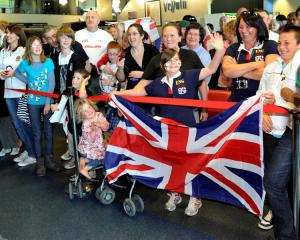The build-up to the 2011 Rugby World Cup (RWC) is gathering momentum in Dunedin, with plans progressing for entertainment, management and security of what is expected to be the biggest international event held in the city.
Dunedin will host three pool matches and six teams during the event in September and October next year.
Plans were well under way for an official alcohol-free, family-friendly Fan Zone in the Octagon, and groups had been set up to work on the logistics of the event, as well as the best ways to maximise opportunities it would provide, council marketing and communications agency manager Debra Simes said.
The Fan Zone would be the centre of the city's RWC "festival". Matches would be shown on big screens and entertainers from around the region would entertain visitors. It would be akin to New Year's Eve festivities, but exact details were still being worked through.
By comparison, Wellington's Fan Zone will feature a rugby village on the waterfront, and Christchurch's a mini rugby ground, big screens for viewing the games, stands for the fans and a large domed tent venue in Cathedral Square.
Various working groups were looking into the council's various responsibilities, which included overseeing and managing much of the local paid and volunteer work force involved in the event, planning and managing transport and traffic, liquor licensing, crowd control, associated entertainment around the city, and ensuring match and training venues and city presentation were up to standard.
Other working groups were looking at how local businesses could take advantage of the opportunities the tournament provided and how any economic legacies that evolved could be maximised in the long-term.
A budget of $200,000 - half to be spent this year and half next year - had been set aside for RWC events and staff costs.
Ms Simes said she was confident the Dunedin City Council could deliver an "outstanding" event on the budget it had.
It was difficult to compare the spending for the RWC of the different councils, because each worked and budgeted differently.
The DCC was likely to be doing much of the same work as other councils, but from within its existing resources, she said.
"Each year we host an international rugby match, we are already capable of holding large events, so it is largely business as usual, with some adaptations for a new stadium and some of the new technologies that will have to be used."
The council was also part of a RWC regional co-ordination group, involving city and district councils, regional tourism organisations, and rugby unions from the Waitaki River south, responsible for planning the best way to promote the region and get the most out of tournament activities in the regions.
Emergency and security planning for Dunedin's RWC games was also progressing.
Representatives from the police, St John, the Fire Service, and the DCC had been meeting once a month since February, said the officer in charge, Inspector Alistair Dickie, of the Dunedin police.
For every scenario there had to be two versions of a response plan - one for Forsyth Barr Stadium, and one for Carisbrook, which would be used if the stadium was not completed.
While the game plan for emergency services would largely be the same as existing plans for international rugby matches in Dunedin, it had to be adapted to guidelines provided by NZ Police for the RWC.
It was too early to say how many emergency service staff would be required to work the days around the games, but it was likely police staff would be called in from other areas to assist, Insp Dickie said.
A leave ban was in place for police staff for the dates around the games.
St John southern region operations manager Doug Third last week said St John was to receive 10 "mass casualty kits" which could hold supplies to triage up to 50 people at a time.
The kits, paid for by the Ministry of Health, were arriving in preparation for the RWC games.




